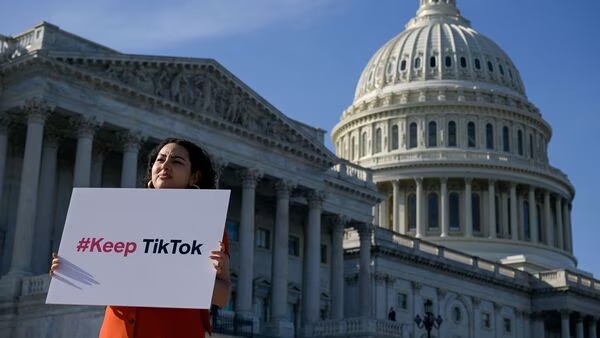TikTok Ban in US: House passes bill with majority, Senate vote next, TikTok contests move & more

The United States House of Representatives on March 13 approved a bill with 352 votes in favour and 65 against, aiming to prohibit the Chinese social media platform TikTok. The bill’s next stop is the US Senate, followed by the White House for the President’s signature.
The move comes as lawmakers in the US reignited discussions about banning Chinese social media apps, including TikTok, which boasts millions of American users, citing national security worries linked to its Chinese parent company, ByteDance.
As per the Bill, ByteDance would have to divest from TikTok within 165 days or leave America. Only if ByteDance opts to sell off its interests could the app continue its US operations.
Furthermore, the House bill stipulates that for TikTok to persist in the US, ByteDance must relinquish its highly sought-after algorithm, responsible for tailoring content to user preferences.
India led the way in banning TikTok in 2020 due to national security apprehensions. At the time, the government highlighted concerns about the popular Chinese social media platform’s data collection practices and potential espionage activities.
US lawmakers on March 13 passed a bill to ban the app in the country unless its Chinese owner sells it. The House of Representatives approved the measure with wide bipartisan support. The vote was the most serious challenge yet to the widely popular short-video app used by 170 million Americans that lawmakers and politicians see as a national security threat. The bill now faces a less certain future in the Senate, where Majority Leader Chuck Schumer has so far declined to endorse it, and members including Republican Rand Paul of Kentucky have come out against it.
The bill called the Protecting Americans from Foreign Adversary Controlled Applications Act if received the President’s accent, would lead to a nationwide ban on the video app. The US lawmakers alleged that ByteDance is beholden to the Chinese government, and could demand the data of over 170 million American users whenever it wants.
Ahead of the House vote, TikTok’s Chief Executive Officer Shou Chew went to Capitol Hill on March 12 to lobby against the bill that would force the app’s Chinese parent to sell it or face a ban in the US. Joined by influencers from the popular short-video platform, Chew sought to persuade senators to reject the legislation.
TikTok has argued that the bill amounts to a ban and it is not clear if China would approve any sale, or that it could be divested in six months. The app says it has not and would not share US user data with the Chinese government. “This legislation has a predetermined outcome: a total ban of TikTok in the United States. The government is attempting to strip 170 million Americans of their Constitutional right to free expression. This will damage millions of businesses, deny artists an audience, and destroy the livelihoods of countless creators across the country,” the company said after the vote.
TikTok told Congress late Monday in a letter seen by Reuters it is “not owned or controlled by the Chinese government” and argued if the company was sold another buyer would not continue TikTok’s $1.5 billion effort to protect U.S. data. “Ironically, U.S. user data could be less secure under a divestment scheme,” the company said.
On March 8, the US Energy and Commerce Committee unanimously approved the measure Thursday with a 50-0 vote, representing the most significant push for a US crackdown on TikTok. The bill gives ByteDance 165 days to divest TikTok; if it does not, app stores operated by Apple, Google and others could not legally offer TikTok or provide web hosting services to ByteDance-controlled applications.
After the bill passed the House vote on March 13, TikTok told employees the company isn’t planning to change its approach to protecting user data even after United States lawmakers passed a bill to ban the app in the country unless its Chinese owner sells it. “Our strategy remains the same — we continue to believe that the best way to address concerns about national security is with transparent, US-based protection of US user data and systems with robust third-party monitoring, vetting and verification,” the company said in a memo to employees that was reviewed by Bloomberg.
In the memo, TikTok reiterated its plans to lobby the Senate not to pass the legislation. It said it intends to exhaust all legal challenges before it considers any kind of divestiture from its parent company, people familiar with the matter told Bloomberg this week.
Several small businesses in the US rely on the platform for selling and marketing their products on TikTok Shop. They have opposed the bill as the ban could impact their lives who have spent years cultivating their following on the platform and rely on it to acquire brand deals or other types of income.
Some experts have told AP news agency that users can find a way to get around the ban. User can try to use virtual private networks, or VPNs, to disguise their location and bypass such restrictions. However, the use of VPNs also raises additional security questions, especially for users who go with a free or cheap VPN provider they haven’t carefully vetted.





